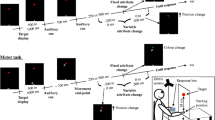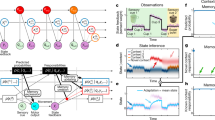Abstract.
We investigated how sensorimotor adaptation acquired during one experimental session influenced the adaptation in a subsequent session. The subjects' task was to track a visual target using a joystick-controlled cursor, while the relationship between joystick and cursor position was manipulated to introduce a sensorimotor discordance. Each subject participated in two sessions, separated by a pause of 2 min to 1 month duration. We found that adaptation was achieved within minutes, and persisted in the memory for at least a month, with only a small decay (experiment A). When the discordances administered in the two sessions were in mutual conflict, we found evidence for task interference (experiment B). However, when the discordances were independent, we found facilitation rather than interference (experiment C); the latter finding could not be explained by the use of an "easier" discordance in the second session (experiment D). We conclude that interference is due to an incompatibility between task requirements, and not to a competition of tasks for short-term memory. We further conclude that the ability to adapt to a sensorimotor discordance can be improved by practicing with an unrelated discordance.
Similar content being viewed by others
Author information
Authors and Affiliations
Additional information
Electronic Publication
Rights and permissions
About this article
Cite this article
Bock, O., Schneider, S. & Bloomberg, J. Conditions for interference versus facilitation during sequential sensorimotor adaptation. Exp Brain Res 138, 359–365 (2001). https://doi.org/10.1007/s002210100704
Received:
Accepted:
Issue Date:
DOI: https://doi.org/10.1007/s002210100704




